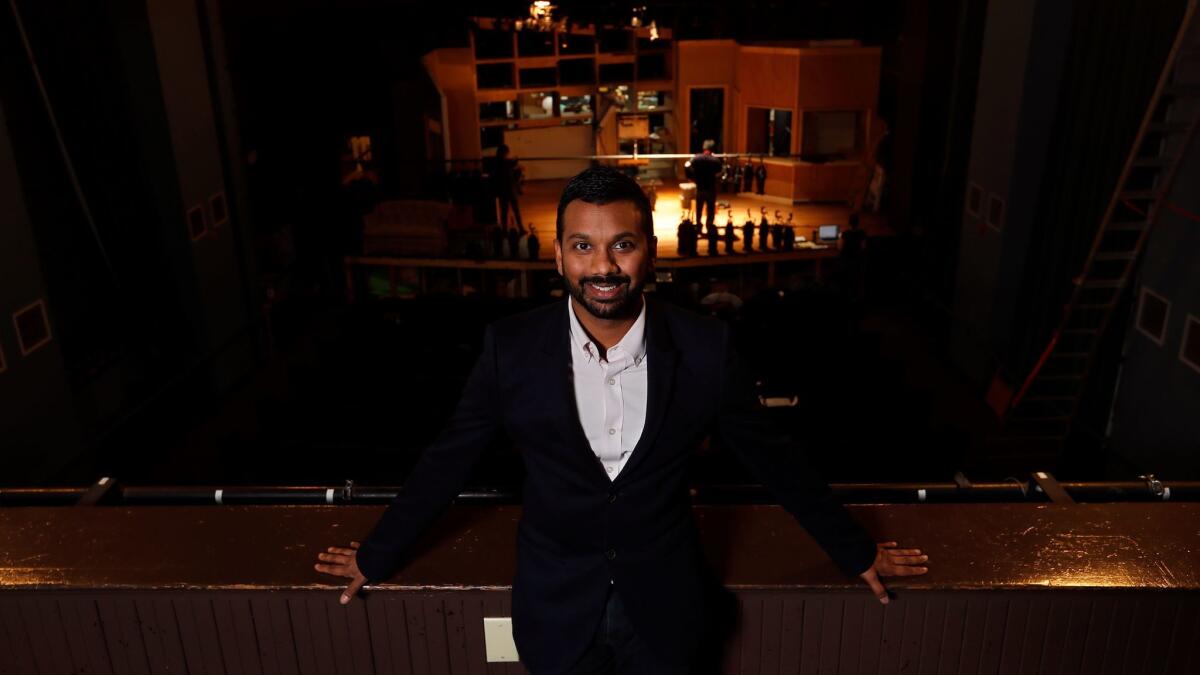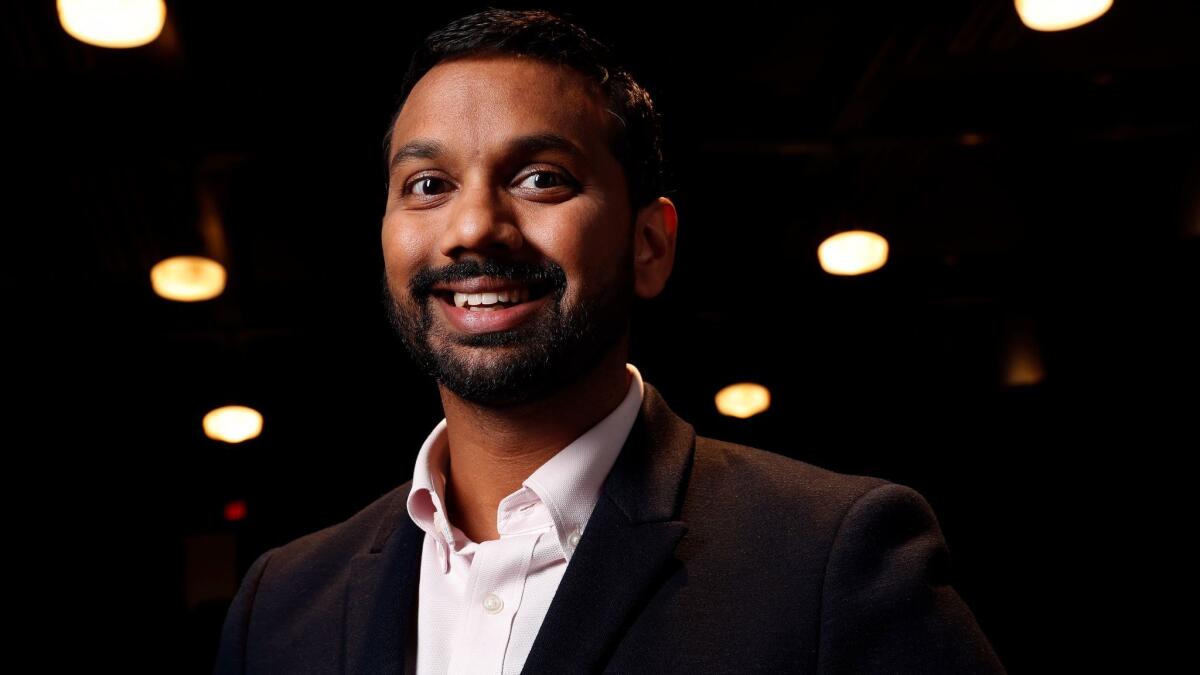The future of Asian American theater? East West Players’ new leader charts a course

- Share via
A woman had vanished — and Snehal Desai needed to help find her. The search for clues led deep inside an old, surreal warehouse filled with eerie spirits.
“Bone-chilling yet mesmerizing,” he says.
Desai, producing artistic director of the East West Players theater company, is describing his recent visit to “Kaidan Project: Walls Grow Thin,” an immersive staging of Japanese ghost stories.
“Kaidan,” created by the inventive Rogue Artists Ensemble, is the first show in a 2017-18 East West season made up entirely of collaborations with local theater, social justice and community organizations. Desai, who became artistic director in July 2016, says the idea of devoting his first full season to partnerships grew out of his commitment to marrying art and activism — in this case, responding to the election of President Trump last year.
“On Nov. 8, the world changed,” says Desai, 37. “Suddenly, speaking up seemed very important. I was in the midst of planning our year and realized that if we made every show a collaboration we could have a larger impact. More than the individual works, the season as a whole is a statement of who we are.”
Pursuing five joint ventures has its challenges — “there are a lot of moving parts,” Desai says — but he hopes it gives the Asian American company “a wider range of theatrical experiences, raises our visibility and connects us with new audiences.”
Desai is sitting in the courtyard of East West’s 240-seat theater in Little Tokyo following a matinee of his second fall show, “Yohen.” Danny Glover is starring with June Angela in Philip Kan Gotanda’s drama about an interracial couple reexamining their decades-long marriage. Glover starred in the 1999 world premiere, which, like this revival, was co-produced by East West and the Robey Theatre Company, an African American ensemble.
Coming next will be the L.A. premiere of “Allegiance,” the musical inspired by actor George Takei’s experiences as a World War II internee. The co-production with the Japanese American Cultural & Community Center opens Feb. 28 at the center’s Aratani Theatre. Desai will direct a cast headlined by Takei, who starred in the show’s 2015-16 Broadway run.
“This is the largest production in our 52-year history,” Desai says, “which is exciting and scary. This also is our biggest season budget at a little more than $3 million — double our usual — because of ‘Allegiance,’ which has special costs and funding.”
East West also is partnering with the Center Theatre Group on the world premiere of David Henry Hwang’s and Jeanine Tesori’s “Soft Power.” The play-that-morphs-into-a-musical about U.S.-China relations opens May 16 at the Ahmanson Theatre.
The partnership primarily consists of outreach and artistic involvement. “East West and CTG audiences can get to know each other through community conversations and the addition of ‘Soft Power’ to our season,” says Desai, who’s been invited to offer feedback during previews.
Desai wanted the last show of the season “to be by someone new,” he says: Nathan Ramos won an East West playwriting contest with “As We Babble On,” a dramedy about millennials of color that debuts June 6 in a collaboration with the Los Angeles LGBT Center.
SIGN UP for the free Essential Arts & Culture newsletter »

We must reach out to other underrepresented people because we live in a city in which communities are not separate, they intersect.
— Snehal Desai, artistic director of East West Players
Throughout the season, Desai says, the nation’s longest-running professional theater of color will explore how to define its role at a time when identity and inclusion are hot issues in both the arts world and the ever-evolving Asian American community.
For starters, says Desai, “we remain committed to our founding missions — still necessary and relevant — of telling Asian American stories and providing visibility and opportunity for Asian American artists.”
Desai, the son of Indian immigrants, is continuing the efforts of his predecessor, Tim Dang, to “embrace the complexity of what it means to be Asian American. East West’s original focus was East Asian. Now, we include South Asians, Filipinos, Pacific Islanders and people of mixed ancestry.
“Next, we must reach out to other underrepresented people because we live in a city in which communities are not separate, they intersect.”
Portraying these intersections, he says, is one way that East West can be a role model for theaters seeking to diversify. Another is to recognize that many people no longer “check off just one box” to identify themselves.
“I don’t prioritize my sexual orientation, my gender identity over my cultural heritage, my being gay over my being Asian,” he says. “East West needs to be a place where we welcome all of our identities into the room.”
Desai joined East West in 2013. The Pennsylvania native graduated from Emory University, received an MFA from Yale and worked as a director before being hired as East West’s literary manager. He rose through the ranks, mentored by Dang. When Dang left after 23 years at the helm, Desai succeeded him, mindful that he had “a learning curve and big shoes to fill.”
“The transition has gone very smoothly,” says Randy Tamura, East West board co-chair. “The artistic director has two focuses: art, where Snehal is solid, and fundraising, where he wasn’t as experienced but has grown a lot.”
“Snehal’s got great talent, energy and ambitions for his company’s future,” says Michael Ritchie, Center Theatre Group’s artistic director, who got to know Desai when Desai embarked on a “listening tour” of area arts leaders. They’ve kept talking, one result being the “Soft Power” partnership.
Asked about East West’s future, Desai cites one of his biggest challenges: “Finding enough money.”
And, as a few lingering “Yohen” playgoers catch his eye, he mentions one of his many goals.
“Today, our audience had a great mix of people, all races, from all over the city,” he says. “We need to broaden our profile. Let people know that we are an Asian American theater, but we tell American stories.”
See all of our latest news and reviews at latimes.com/arts.
YOU MIGHT ALSO LIKE:
Review: Art gallery installation or play? It’s ‘Caught’
Review: ‘Underneath the Lintel’ with Ayre Gross
Review: A gripping ‘Taking Sides’ at the Rubicon
The 99-Seat Beat: Our weekly picks in the small-theater scene
Yayoi Kusama at the Broad: Lots of mirrors, not so much reflection
More to Read
The biggest entertainment stories
Get our big stories about Hollywood, film, television, music, arts, culture and more right in your inbox as soon as they publish.
You may occasionally receive promotional content from the Los Angeles Times.










